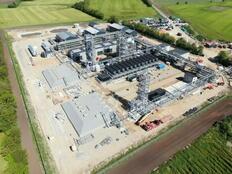- The eSAF facility will produce 12,000 liters daily near Padborg, Denmark.
- Metafuels' aerobrew technology converts methanol to jet fuel with up to 90% emission reduction.
- European Energy's Power-to-X facility in Padborg will exceed the output of its Kassø facility.
- Aviation accounts for over 2% of global CO2 emissions, contributing around 3.5% to global heating.

Project Overview
Metafuels AG, a Swiss aviation technology company, is collaborating with European Energy to establish a synthetic sustainable aviation fuel (eSAF) facility near Padborg, Denmark. This facility will be constructed next to a future Power-to-X facility by European Energy and is expected to produce approximately 12,000 liters of eSAF daily.
Technological Advancements
The facility will utilize Metafuels' scalable aerobrew technology, which converts sustainably produced methanol into jet fuel. This technology boasts high energetic efficiency and achieves up to a 90% reduction in life cycle emissions compared to conventional jet fuel. As a drop-in fuel, it is compatible with existing aircraft and fueling infrastructure, requiring no re-engineering or repurchasing.
European Energy's Role
European Energy is developing a Power-to-X facility in Padborg, which will have more than three times the output of their current facility in Kassø. This development is part of a broader effort to meet aviation industry climate targets, aligning with the European Union’s RefuelEU Aviation initiative and the Carbon Offsetting and Reduction Scheme for International Aviation (CORSIA).
Environmental Impact
The aviation sector is responsible for over 2% of global CO2 emissions, amounting to approximately 800 million tonnes. This figure does not include other greenhouse gases and climate co-factors related to the nature and altitude of emissions, which contribute around 3.5% to global heating. The new eSAF facility aims to significantly reduce these emissions, supporting the green transition in aviation fuels through renewable energy.

